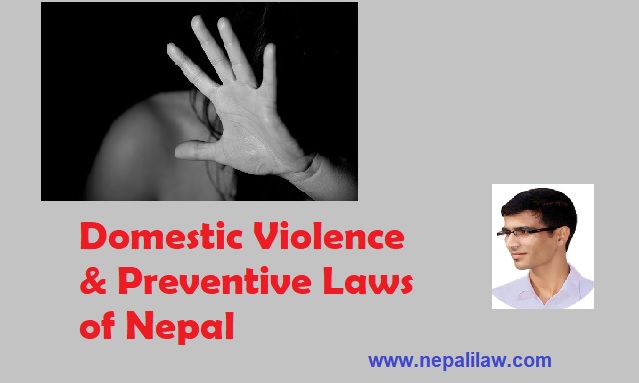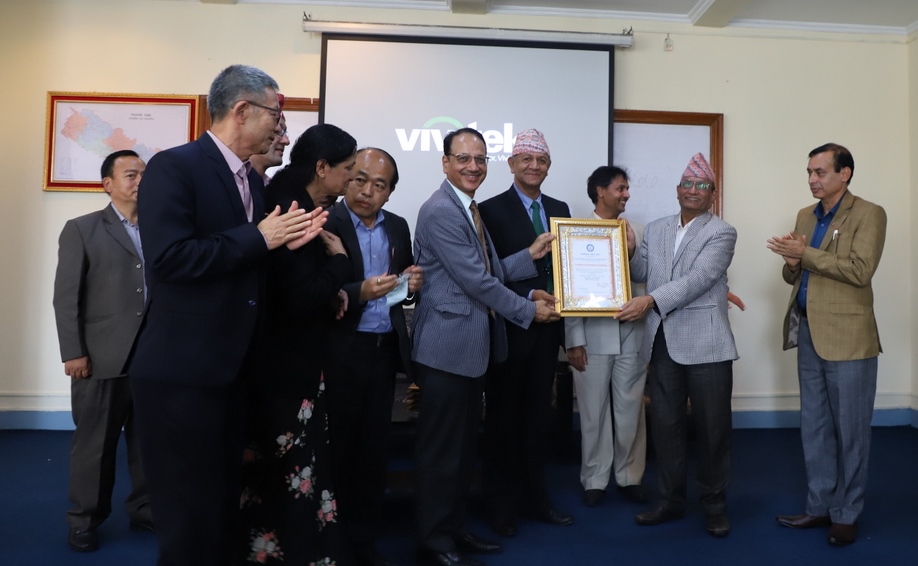Devendra Puodel
Introduction:
– Domestic violence is one of the major forms of violence against women. Violence by a family member is also called domestic violence. In Nepali society, there is a traditional view that domestic violence is a matter of personal or domestic matter.
– Physical, mental, sexual and economic damage to someone from a close person is called domestic violence. It comes from close relatives in private and public life.
– Defining domestic violence as per Section 2 (a) of the Domestic Violence (Misdemeanor and Punishment) Act, 2066, Domestic violence means physical, mental, sexual or financial torture inflicted on another person with a domestic relationship and the term includes abuse or emotional injury. Indicates any other action to be taken.
– Domestic violence is based on compounding. It is growing like a subject of conflict. It is of the nature of moving from person to person, daughter to daughter-in-law, mother-in-law, brother-in-law. It is a product of social and cultural fabric.
Objectives of the Domestic Violence (Fault and Punishment) Act, 2066
– To make violent acts punishable within the family or in association with the family,
– To control violent acts within the family or at home,
– To provide justice by protecting the victims of domestic violence,
– Respecting the right of every person to live in a safe and dignified manner, punishing acts of violence within the family or in connection with the family, controlling such acts and providing justice to the victims of domestic violence,
– Respecting the right of every person to live in a safe and dignified manner, punishing the acts of violence within the family or in connection with the family, controlling such acts and providing justice to the victims of domestic violence.
Types of Domestic Violence
– Physical torture: Beating, illegal detention, bodily injury, acid or other similar substances such as pollen, dummy, dali, ghasi, inflicting pain on the body or disfiguring the face or any part of the body or doing any other such thing. Must work
– Mental torture: intimidation or threat of physical torture, intimidating behavior, abusive language, lying, eviction, discrimination based on ideological, religious or cultural and customary traditions, appearance, physical appearance and any disease. Insults to the ground, loss of mental balance, incitement to commit suicide, or creating a situation of suicide, and the term can cause mental or emotional injury or any other act.
– Sexual Torture: Sexual abuse involves any act such as insulting, discouraging or hurting self-esteem, harming safe sexual health.
– Economic Torture: Economic torture refers to the use of private property or to deprive people of access to or use of employment or financial resources, to demand dowry, to demand dowry, or even to hate, despise or despise for not bringing dowry.
Body for processing complaints
– Complaints related to domestic violence can be lodged at the police office or the National Commission for Women or local bodies or directly in the court. The aggrieved party can decide for itself where to file a domestic violence complaint. Anyone who finds out that domestic violence has happened, is happening or is about to happen can file a complaint, both orally and in writing. However, a complaint must be lodged within 90 days of the date of the domestic violence.
Action on complaints registered with the National Commission for Women
– Complaining: The victim herself or someone on her behalf can file a complaint before the National Women’s Commission in the prescribed format. Apart from this, the victim can lodge a complaint by giving verbal information by post, radio, telefax, electronic mail or telephone.
– Investigating: In connection with the registered complaint, the National Commission for Women may conduct necessary investigation in case any woman is a victim of any violence or social evil.
– Reconciliation: If such investigation shows that someone has done such thing, the Commission may give necessary instructions to the concerned body to reconcile as per the need or to provide appropriate treatment, relief or compensation to the victim woman or to rehabilitate.
– Recommendation or Monitoring: The Commission may recommend to the concerned office, body or institution to take other appropriate action and monitor whether it is compliant or not.
Complaint registered with the police office or local body
– Regarding the complaint registered at the police office, the perpetrator should be arrested within 24 hours except for the time limit and if he disobeys, he should be arrested and given a statement.
– If the complaint is registered with the local body, the perpetrator should be summoned within 24 hours except for the time limit and if the perpetrator does not show up, he / she should be arrested with the help of the police.
– The case should be settled within 30 days from the date of expiration, withdrawal or arrest of the perpetrator.
– If the victim is found to have suffered any physical injury or mental torture due to domestic violence, he / she should be sent to the hospital or health center for immediate treatment.
– A copy of the investigation report conducted by the local body should be sent to the police office.
– Preliminary investigation of the complaint to provide security to the victim
If necessary, security arrangements should be made immediately with the help of the police office.
– If the perpetrator’s statement shows domestic violence and if the victim wants, the police office and the local body should reconcile between the two parties within 30 days from the date of complaint.
– Psychiatrists, sociologists, social workers, family members believed by the victim and other witnesses may be assisted as long as available during reconciliation.
– Reconciliation should take into account the psychological and social impact of the victim and the victim’s right to privacy.
Complaint proceedings in the court
– In case the perpetrator is not present or cannot be present or there is no reconciliation between the parties, if the police office or local body agrees with the complainant, the complaint should be submitted to the court within 15 days from the expiration date. The action edges.
– Victims of domestic violence can file a complaint directly in court if they wish.
– The Government of Nepal will continue to be a plaintiff on domestic violence. Such cases should be settled within 90 days.
– If the victim requests, the complaint related to domestic violence should be processed and heard by the court in a closed session.
– During the preliminary investigation of the complaint, if it is necessary to provide immediate protection to the victim, the court may order interim protection until the final decision of the complaint. If someone commits domestic violence, such person will be fined Rs. 3000 to Rs. A fine of up to Rs 25,000 or imprisonment for up to six months or both can be imposed.
Guilt and punishment
– According to the prevailing law, if acid or any other substance causes pain or ugliness in the body by rubbing, rubbing, rubbing, rubbing, rubbing, rubbing, rubbing, rubbing, rubbing, rubbing, rubbing, rubbing, rubbing, rubbing
– Domestic Violence Industry: Domestic Violence Industry, inciting or cheating is half the punishment of the main culprit.
– In the case of repeated perpetrators: If a person who has been convicted of domestic violence once commits the same offense again, the punishment is doubled.
– If a person holding a public office commits violence: If a person holding a public accountability position commits a crime, he or she will be punished by an additional ten percent.
– Failure to comply with the court’s interim protection order: A person who does not comply with the interim protection order issued by the court is liable to a fine of Rs 2,000 to Rs 15,000 or imprisonment for up to four months or both.
Necessary assistance system for victims
– Arrangement of drug treatment
– Compensation
– Arrangement of service center
– Provision of service fund
– The perpetrator should bear the cost of treating the victim of domestic violence. But if the perpetrator does not provide such expenses immediately, the Women and Children’s Office will have to admit him.
– If a person who is a victim of domestic violence is mentally or physically disabled, he should be treated in the hospital and the entire cost of treatment should be paid by the perpetrator.
– If the perpetrator does not pay the expenses, the court can order women’s development.
Achievements
– For the first time legally, domestic violence has been banned in accordance with commitments made in international documents.
– Defining physical, sexual, mental and economic violence between persons with domestic relations and bringing them under the ambit of law and imposing penalties,
– Efforts have been made to make the complaint process easier and simpler so that complaints can be lodged with various agencies.
– Respect the victim’s right to privacy,
– Provision has been made to compensate the victim,
– Attention has been paid to the safety of the victims. Such as:
– Service fund established
– Courts, government prosecutors, police have been trained on gender, violence against women.
– Women protection officers have been appointed.
– Service centers have been established
– Establishment of one door crisis management center
– With the establishment of Women and Children Service Centers in the District Police Offices, the sensitivity and activism of the police towards gender based violence has started increasing
– Psychological and legal counseling services have started to be provided by the service providers for the victims of violence
– Government offices, bars, civil society and non-governmental organizations are increasingly active in raising awareness against domestic violence, protecting victims and taking legal action against perpetrators.
Problems and challenges
– Even though women are more likely to be victims of domestic violence because they are women, the word ‘woman’ is not mentioned anywhere in this law, so should we consider the law as a special provision for women or not?
– Despite the provision of complaints in many bodies, the involvement and cooperation of the police is essential to arrest the perpetrators, but in the end, the only thing that can be done is to show reconciliation.
– Kathmandu-based National Commission for Women to facilitate access to justice for women in remote areas of the district by taking complaints easily.
– Domestic violence is prevalent in all districts, NPAs, VDCs, wards, tolls, communities, but service centers should be opened only in some districts,
– Service Centers find it difficult to operate according to their own standards. Government monitoring is weak
– There is a question of non-monitoring of the service centers and the question of stability
– Service Fund is concentrated in Kathmandu, service needs are not decentralized to the remote villages of the victims of violence
– In the current judicial courts, where there is a lot of pressure on regular criminal and civil cases, it is difficult to give priority to cases of violence against women and it seems to be limited to brief procedural principles.
Solutions
– 11 years since the enactment of the Domestic Violence Act
There should be a study and research on the strengths and weaknesses and impacts seen in its implementation (how many cases are registered, the nature of incidents of violence, dimensions, difficulties and problems, aspects that need to be improved, etc.)
गर्ने Timely amendments will be made in the law based on the results obtained from the study and research
– Laws should be amended to allow criminal and civil domestic violence to proceed accordingly.
– Legal action should be ensured according to the nature of the incident
– Rather than thinking of taking action only after the victim has lodged a complaint, the state itself should take the lead and take responsibility for the protection of the victims.
– Emphasis should be placed on zero tolerance rather than reconciliation
– There should be a separate family court or special bench to hear cases of domestic violence
– There should be a layered system to give access to justice considering the nature and severity of the incidents of domestic violence
– New dimensions are being added to domestic violence. Their factors, effects and implications should be addressed in the law,
– Raising awareness about domestic violence laws,
– Permanent arrangement of women protection officers,
– In case of non-delivery of services to the victims of violence due to lack of security and the amount of services to be provided to them, but the amount deposited in the service fund at the center is not spent, the practice of simple money transfer should be adopted.
निर्माण Adequate budget will be allocated from the service fund as prescribed by law for the establishment of standard standards for the operation of conservation homes / service centers.
गर्ने Partnership between three tiers of government and non-governmental organizations will be established in the operation of service centers.
Finally,
Strengthening the law on domestic violence is not the only way to eradicate it. Since this reduction can only be achieved through public awareness, it is not possible for the government alone to eradicate it. It is necessary for all stakeholders to attack its elements by encircling them.
Poudel is a branch officer of the Government of Nepal and is pursuing a master’s degree in human rights law.
 Nepali Law A complete legal information portal
Nepali Law A complete legal information portal




